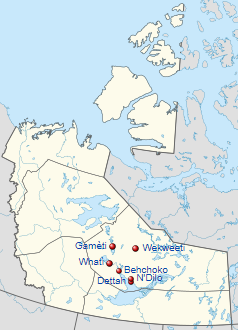 |
 |
 |
| Home | More Articles | Join as a Member! | Post Your Job - Free! | All Translation Agencies |
|
|||||||
|
|
Dogrib language
The Dogrib language or Tłı̨chǫ Yatıì is a Northern Athabaskan language spoken by the Tłı̨chǫ (Dogrib people) of the Canadian Northwest Territories. According to Statistics Canada in 2011, there were 2,080 people who speak Tłı̨chǫ Yatıì. Tłıchǫ Yatıì is spoken by the Dene First Nations people that reside in the Northwest Territories of Canada, the Tłıchǫ. Tłı̨chǫ lands lie east of the Mackenzie River between Great Slave Lake and Great Bear Lake in the Northwest Territories. There are four primary communities that speak the language: Gamètì (formerly Rae Lakes), Behchokǫ̀ (formerly Rae-Edzo), Wekweètì (formerly Snare Lakes) and Whatì. From a population number of about 800 during the mid-19th century to about 1,700 by the 1970s, the population has grown to about 2,080 as recorded by the 2011 Census. However, Tłıchǫ Yatıì has seen a decrease in mother tongue speakers, hence placing it under the list of endangered languages. The Tłıchǫ region covers the northern shore of Great Slave Lake, reaching up to Great Bear Lake. Rae-Edzo, now known by its Tłıchǫ name, Behchokǫ̀, is the largest community in the Tłıchǫ region. According to the Endangered Languages Project, approximately 1,350 people speak the language while at home. Speakers are commonly fluent in English.
HistoryTłıchǫ Yatıì was traditionally only an oral language. But in 1992, the first edition of the Tłıchǫ Yatıì Enįhtł’è — A Dogrib Dictionary was published which provided the Tłıchǫ people with a database of words and spelling. This sparked the interest of community members and became the first step in revitalization efforts. In 2005, the Tłıchǫ signed the Tłıchǫ Agreement for Self-Governance. This allowed the Tłıchǫ people to prioritize the preservation of their language, culture and way of life. Since its implementation, the Tłıchǫ Government has been working hard to help younger generations of Tłıchǫ learn the language by declaring Tłıchǫ Yatıì as one of two official languages of the Tłıchǫ Government. Revitalizations efforts include putting up signs in Tłıchǫ Yatıì, creating on the land programs, providing Tłıchǫ Yatıì classes for community members. Geographic distributionThe language is mainly spoken in the Northwest Territories of Canada. The four official Tłıchǫ communities are Gamètì, Behchokǫ̀, Wekweètì and Whatì, although both communities of Yellowknife and Dettah also have many Tłıchǫ speakers. PhonologyConsonantsThe consonants of Tłıchǫ Yatıì in the standard orthography are listed below (with IPA notation in brackets):
Tenuis stops may be lightly voiced. Aspirated stops may be fricated [Cˣʰ] before back vowels. 
Tlicho communities in the Northwest Territories VowelsThe language uses long, short and nasal vowels, and distinguishes them in writing, along with low tone:
GrammarTypologically, Tłıchǫ Yatıì is an agglutinating, polysynthetic head-marking language, but many of its affixes combine into contractions more like fusional languages. The canonical word order of Tłıchǫ Yatıì is SOV. Tłıchǫ Yatıì words are modified primarily by prefixes, which is unusual for an SOV language (suffixes are expected). Like Spanish and Portuguese, Tłıchǫ Yatıì has two verbs similar to English ‘be’. One is used for ways of being that are more dynamic or temporary; the other for more permanent and immutable properties. For example, nàzèe-dǫǫ̀ ts’ı̨ı̨lı̨ and nàzèe-dǫǫ̀ ats’ı̨ı̨t’e both mean ‘we are hunters’, but the first means that the speakers are currently hunters (for example, part of a hunting party), while the second implies that hunting is their regular profession. In addition to verbs and nouns, there are pronouns, clitics of various functions, demonstratives, numerals, postpositions, adverbs, and conjunctions in Tłıchǫ. The class of adjectives is very small, probably around two dozen words: most descriptive words are verbs rather than adjectives. ExamplesExample words and phrases:
Published in April 2020.
E-mail this article to your colleague! Need more translation jobs? Click here! Translation agencies are welcome to register here - Free! Freelance translators are welcome to register here - Free! |
|
||||||||||||||||||||||||||||||||||||||||||||||||||||||||||||||||||||||||||||||||||||||||||||||||||||||||||||||||||||||||||||||||||||||||||||||||||||||||||||||||||||||||||||||||||||||||||||||||||||||||||||||||||||||||||||||||||||||
|
Legal Disclaimer Site Map |